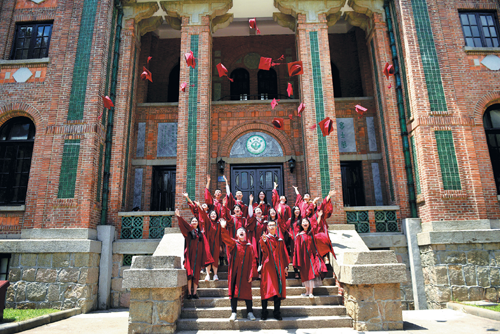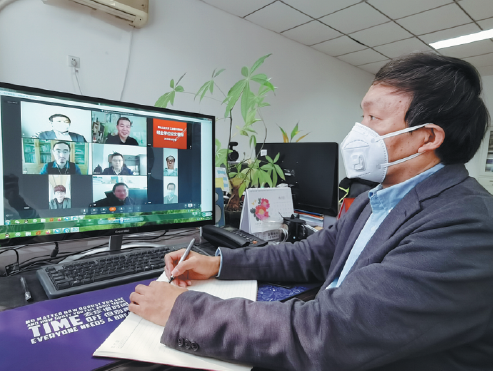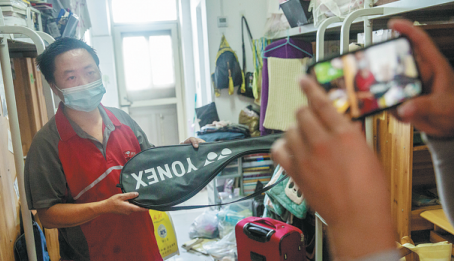
Donning academic gowns, students from Sun Yat-sen University in Guangzhou, Guangdong province, pose for a graduation photo in front of a landmark building on campus this month. JI DONG/CHINA NEWS SERVICE
At an unconventional graduation ceremony in Jiangsu province last month, the whir of motors could be heard as the "students" moved across the stage to receive their diplomas.
Ye Meilan, the president of Nanjing University of Posts and Telecommunications, smiled as she greeted the graduates, dressed in academic gowns, and turned the tassels on their mortar boards.
However, the students were humanoid robots with tablets placed where their heads should be to allow the real students to interact with the president via video-conferencing.
The futuristic ceremony was held at the university's campus on May 22, with more than 1,500 master's and doctoral students receiving their diplomas.
A small group of students was selected by the university to physically attend the graduation, while a large number of graduates and their families watched the ceremony at home, kept away by the COVID-19 pandemic.
The two robots used in the ceremony were built by students from the university's robotics club to enter in competitions. The club members spent nearly three weeks turning the robots into human-like forms capable of taking the places of the graduates.
"It was really memorable to attend my master's graduation ceremony this way," one of the graduates told Pear Video, a popular streaming app.
One netizen wrote that watching the ceremony seemed weird, "like a scene from a horror movie", yet added "I cannot help but feel moved by how much the university wanted to let every student experience their own graduation ceremony."

A faculty member listens to students' defense of their master's theses via a livestream at Northwestern Polytechnical University in Xi'an, Shaanxi province, in March. ZHAO BIN/FOR CHINA DAILY
Postponements
Tertiary institutions around the country have postponed graduation ceremonies, moved them online or canceled them outright due to the novel coronavirus outbreak.
As the COVID-19 pandemic forced commerce and industry online, so too have 8.74 million college students taken to the internet to complete their graduations.
This utilization of the internet not only applies to celebrations, ceremonies and photo shoots, but also students finalizing their theses and seeking jobs.
Unlike school students, who gradually returned to the classroom as the first wave of the pandemic waned, the reopening of colleges and universities has been more cautious in order to control large population movements.
Even universities that began welcoming students back on campus in late May have canceled graduation ceremonies and group photo sessions.
Some college students on the verge of graduating have only been allowed back on campus for several days to tidy up loose ends, pack up their belongings and collect their diplomas.

A delivery man collects belongings of graduates unable to return to campus in Wuhan, Hubei province, this month because of the COVID-19 pandemic. The students' belongings will be mailed to them. KE HAO/FOR CHINA DAILY
Disappointment
Peng Haibi from Wuhan in Hubei, the Chinese province hit hard by the novel coronavirus, studied hard for his communication engineering degree at Beijing Jiaotong University.
The 22-year-old had hoped that his graduation ceremony, originally scheduled for this month, would be an opportunity to reflect on his accomplishments. He had intended to bring his parents from Wuhan to share in the celebrations.
However, the COVID-19 pandemic brought his plans unstuck. He went back to Wuhan for Spring Festival holidays and was unable to return after the city was locked down for 11 weeks from January 23.His university in Beijing had also closed its doors, allowing only a handful of students to remain on campus and making any chance of Peng returning impossible.
Beijing Jiaotong University eventually announced that final-year students could return to campus on June 18, but this was later canceled after a cluster of cases emerged in the capital.
Peng, who is still in Wuhan, is unsure when he will be able to return to the university to pack up his belongings and whether he will have the opportunity to say goodbye to his friends and teachers.
He said an online graduation can't replace the real event as it lacks the emotion, prestige and passion of a ceremony.
"There are so many teachers that I would like to thank and talk to. I still want to meet my friends… so yeah, this lack of a proper farewell makes me pretty sad," Peng said.
Missing memories
Ahmat Tohniyaz, 25, a final year hydropower engineering student at Huazhong University of Science and Technology in Wuhan, also regrets missing his graduation ceremony.
He stayed on campus during the lockdown and had planned to go home after his graduation ceremony this month.
However, he returned home to Aksu, Xinjiang Uygur autonomous region, on May 16 after accepting a job offer and being asked to start work immediately.
The graduation ceremony that he had dreamed about since he was a freshman had been moved online, the university announced.
In late May, he presented his defense of his dissertation to five professors via a video conference.
In front of the camera, Ahmat and a dozen other students talked about their dissertations and presented images and graphs on a computer screen to back their arguments.
"The whole dissertation defense process took about 20 minutes and luckily I passed and only needed to make small changes to my dissertation," Ahmat said.
"However, one of my biggest regrets is being unable to attend the graduation ceremony and take pictures with my friends and teachers wearing the cap and gown."
Ahmat said he had imagined taking many graduation pictures with his friends and classmates at campus and city landmarks. However, he was unable to see any of them before he went home in May as the university had not reopened.
"The last time I saw them was in January. It will be hard for us to meet again as we will go to different places after graduation," he said.
The school sent his graduation gown, diploma and graduation certificate to him via express delivery. Ahmat said he plans to take selfies of himself in the gown and photo shop the images into pictures of landmark buildings and locations.
Ye Dongnan, 22, a senior student at Huazhong University of Science and Technology, said she and other students had created a free miniapp on WeChat that produces graduation photos that appear to be taken on campus.
The photo-service app allows students, and their friends, to insert their faces on avatar bodies in photos taken outside university buildings.
Within eight hours of the app being launched on May 20, it had attracted more than 10,000 users, she said.
"We did not do any advertising for the app," Ye said.
"Students started to use the app after they saw the cartoon-style graduation photos on WeChat."
The creators of the app later added iconic buildings from other tertiary institutes, such as Wuhan University and Central China Normal University.
More than 50,000 graduates have used the app to create personalized graduation photos, Ye said.
Brief encounter
Yang Liu, a third-year graduate student at Peking University, returned to campus on June 10.
From June 6, the university started to allow students preparing to graduate to gradually return to school.
However, due to the cluster cases in Beijing, the university stopped the practice on June 17, by which time Yang was already back on campus and allowed to stay.
"I was really happy that I could return to the school after spending almost five months at home," the 25-year-old said. "Everything looks more or less the same as it did in January when I left the school, yet the number of students in the school is significantly less than before, which is a reminder about the pandemic."
Students are not allowed to leave the campus and the school does not permit large gatherings of people, she said.
They can stay in the dorms after their health codes and nucleic acid test results for COVID-19 are verified. Each dorm room accommodates two students, compared to four to six before the outbreak, she said.
Yang's graduation trip has been canceled and she is scheduled to start work at a Beijing company after she tidies up her affairs at the university later this month.
"It feels like I have not properly celebrated my graduation before I have to leave the ivory towers behind and enter society," Yang said.
"Although I am disappointed, it is comforting to know that I am going through this with millions of other students."
Zhou Lihua in Wuhan contributed to this story.



